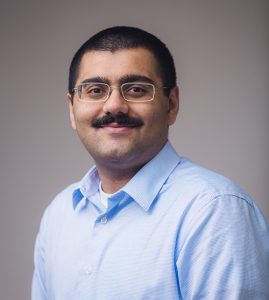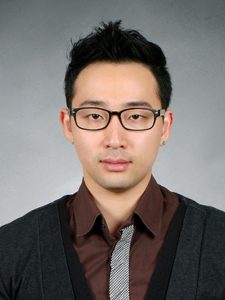Summer 2018 was a good one for Aashutosh Mistry and Haegyeom Kim. Both were awarded ECS Summer Fellowships to further explore their research within a lab and to advance within their fields.
“The ECS Summer Fellowship program offered me the time and money to explore questions and pursue research I couldn’t explore during my PhD. Without the fellowship, I couldn’t have done this,” says Aashutosh Mistry, a PhD student at Purdue University.
Mistry is one of five recipients of the 2018 ECS Summer Fellowship program designed to assist students during the summer months, June through August, in the pursuit of work in a field of interest to ECS. He is just one example of how the fellowship directly effects and encourages young researchers to explore and expand their studies.
Mistry explains that during his PhD study, he’d often discover problems he thought were worth pursuing. However, because these problems were not considered part of the main objective of the project, and also considering deadlines and time constraints, Mistry did not have the flexibility to explore these questions.
“You often cannot pursue these science questions, which, at end of the day, ties back into the project,” says Mistry, adding, “These things they take time.”
The Edward G. Weston Summer Fellowship offered him the opportunity to dive into these very questions.
“It was really an amazing experience,” says Mistry. As part of his fellowship, Mistry worked in the Argonne National Laboratory for two months, under the guidance of his supervisor Venkat Srinivasan, a longtime ECS member. Mistry says researchers like Srinivasan, as well as other others who guided him along the way, were a plus side to the experience, offering him an excellent networking environment. He also acknowledges the constant support and guidance of his PhD advisor, Professor Partha P. Mukherjee.
During his time at the Argonne National Laboratory, he pursued work in porous electrodes for lithium batteries.
“These electrodes are made up of energy storing phase as well as other materials, and their geometrical arrangement is commonly referred to as microstructure,” says Mistry, describing his research. “Now traditionally, in our community people have focused on developing lithium materials that will perform better, but they haven’t focused that much on the geometrical aspects of this material. The geometry of these materials also affects the response of the metrics themselves. So at the end of the day, whether my battery lasts for 10 hours or 12 hours—is a function of what material goes in as well as how they are arranged geometrically.”
Mistry says the difficult part is finding the geometrical properties. “Just because of the size of these things, there are features that exist at the scale of 100 nanometers to 10 microns. And, then there are other sorts of problems because we cannot visually see that smaller features, so we have to do x-ray tomography, and it opens up all different kinds of questions if you want to probe the geometrical aspects,” says Mistry. “So we tried posing a different question: can we do simpler experiments to probe relevant geometrical aspects?”
In addition to his fellowship research, Mistry is working on publishing papers that highlight the results of his experiments over the course of the summer.
“I’m really happy that I’ll have at least two articles coming out from the studies I did as a part of my fellowship,” says Mistry, who is in the draft stages of the writing process.
He credits a big part of his success in the summer fellowship program to formulate a game plan of goals he sought to accomplish ahead of time. If he could give one point of advice to other fellowship recipients, it’d be to do the same.
“I think what really helped me to get the best out of the fellowship was having a list of questions that I wanted to pursue. Saying, ‘Okay, what are the things I can do? What is my plan A? Plan B? Plan C?’ I had all those things ready before I started my fellowship,” says Mistry. “In fact, I had those things ready even before I applied. It helped me quite a lot to make the most out of the time I had.”
Haegyeom Kim, a Colin Garfield Fink Summer Fellowship winner and a postdoctoral fellow from Lawrence Berkeley National Laboratory, says the fellowship application process was a great learning experience in itself.
“For researchers, it’s very important to lead their own career development,” says Kim. “As an independent researcher, I have to learn how to prepare the proposal to get the research fund and grant, so this is a good example and practice as to how to prepare proposals and successfully get funding.”
Because of this, Kim says he was thrilled to receive the news that he had been accepted to the fellowship program.
“I knew this was a good opportunity, and I felt a responsibility to finish work completely and successfully,” says Kim.
He says the responsibility of managing the award money taught was yet another lesson beyond his research.
“This fellowship allowed me to conduct my own research and taught me how to handle my small fund and how to lead my research in the real world,” says Kim. “This is really a big, important example of how I will run my grant in near future.”
Kim’s research focuses on understanding the correlation of the electrochemical properties in the battery system.
“During the fellowship season, I studied on how to alkaline ion species like lithium, sodium, and potassium can affect its electrochemical property in the electromaterials,” says Kim. “Based on this study, I will continue to investigate how to design the electromaterials for specific alkaline batteries.”
Kim says he believes the Colin Garfield Fink Summer Fellowship truly serves as an asset to postdoctoral researcher’s career development.
“This fellowship taught me how to complete my work independently,” says Kim. “Thank you for donating to the program.”
Your donations to the education fund help make fellowships like these and others possible.
Donate to the education fund today
2018 Fellowship Recipients:
Haegyeom Kim
Lawrence Berkeley National Laboratory
Supervisor, Professor Gerbrand Ceder
Colin Garfield Fink Summer Fellowship*
Jeffrey Henderson
University of Western Ontario
Advisors, Dr. James Noel and Dr. David Shoesmith
Herbert H. Uhlig Summer Fellowship
Xinyou Ke
Case Western Reserve University
Advisor, Dr. Robert Savinell
F. M. Becket Summer Fellowship
Yi Peng
University of California – Santa Cruz
Advisor, Professor Shaowei Chen
Joseph W. Richards Summer Fellowship
Aashutosh Mistry
Purdue University
Advisor, Professor Partha Mukherjee
Edward G. Weston Summer Fellowship
Applications for the 2019 ECS Summer Fellowships opened on September 15, 2018. Apply today.




